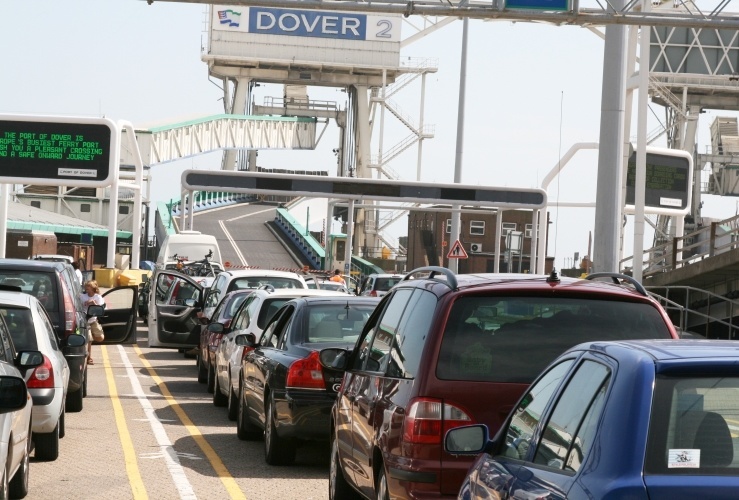
Crossing the Channel by car is a great way to travel for a trip to France and beyond.
If you've never made the crossing before, you may not be aware that there is more than one way to do it.
Should you opt for the Channel Tunnel or take your motor on a ferry?
It can be a bit confusing and overwhelming if it's your first time making the Channel crossing by car as there are a myriad of options available to you.
Here is a guide to help you decide which way crossing the Channel by car will work best for you and which to avoid.
Cross Channel Car Ferries: Dover to Calais
This major ferry port is the best-known and most popular way to cross the Channel, which means there are a host of operators to choose from when it comes to what boat you board.
During peak periods, there are more than 30 Channel ferry crossings every day, so you will not be restricted in terms of the time of your departure.
No matter which operator you pick, the crossing will take the same amount of time - 90 minutes - so shop around to see which operator is able to offer the cheapest cross channel route.
This is the quickest of the ferry crossing available to you, but it is still much slower than taking a Eurotunnel train.
Cross Channel Ferries: Dover to Dunkerque (or Dunkirk)
You may not have realised you could cross the Channel by car from Dover to Dunkerque, as this route is lesser known than the one to Calais.
It takes around 40 minutes to from Dunkerque to Calais, so it's well worth exploring this Channel crossing option to see if it's cheaper for you.
However, keep in mind that the crossing itself is around 30 minutes longer than the direct ferry. But if you planned to drive from Calais to Belgium, this will be the most convenient route for you, as Dunkerque is closer.
Eurotunnel Train: Folkestone to Calais
The Eurotunnel train is by the far the fastest option to get you from England to France, but arranging your crossing via the channel tunnel with a car comes without the comfort of crossing by ferry.
There are no restaurants to grab a bite to eat on your journey, no lounges to relax in and no amusements to keep you and your passengers entertained.
Not only will you have to take packed lunches, you will more than likely pay considerably more to travel via train compared to the ferry from Dover, even when booked in advanced.
The crossing cost of a car in Channel Tunnel can vary. Last-minute bookings in peak season will attract a high price tag. Eurotunnel generally don’t publish fares as far in advance as the ferry companies, but in either instance, it will be more likely that there will be better deals available if you can arrange your booking in advance.
The Eurotunnel takes only 35 minutes, making this option ideal for those that want a fast crossing as they have a long journey ahead once they reach France. If that isn't an issue, save money by jumping on one of the cross Channel car ferries.
Cross Channel Car Ferry: Newhaven to Dieppe
Again, you may not be aware of this crossing, as it's another obscure one compared to Dover-Calais.
Popular among those who are travelling from the south-east of England who want to make their way to western France, the crossing takes around four hours and there are two journeys made each day.
The Channel ferry crossing from Newhaven will cost less than travelling from Portsmouth, but will be more than setting sail from Dover.
Cross Channel Car Ferry: Portsmouth to Le Havre
The cheapest cross Channel route crossing from Portsmouth to Le Havre is the nine-hour overnight ferry, which comes with the bonus of allowing you and your passengers to get a full night's sleep before you continue your journey in France.
However, this may cost more than other ferries that run from the same port during the day, which usually take around five-and-a-half hours.
Cross Channel Car Ferry: Portsmouth to Caen
Channel ferry car crossings from Portsmouth to Caen can take between six to seven hours, depending on whether you choose an overnight or day journey, and it will take you closer to central and south-eastern France than the trip to La Havre.
A cruise ferry usually operates this crossing, meaning the journey will be more luxurious and you can pay extra to enjoy the privacy of a cabin.
European Breakdown Cover
If you are going to cross the channel in your car, you should ensure that you have appropriate breakdown cover in place in case you do breakdown in Europe.
Start Rescue offer a host of benefits as part of our European breakdown cover packages, including pre-departure cover of up to £500 towards the cost of rebooking your original Channel ferry or Eurotunnel crossing to the nearest available date once your vehicle has been repaired.
And before you do embark on your cross Channel journey with you car, take a look at our pre-Euro trip checks blog, which provides some handy advice on things to check before you head out on the road in Europe.




